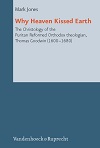| Buchhandlung Heesen | Versandbuchhandlung für Evangelische Theologie |
Impressum | |
| Freudenstadt / Loßburg | Datenschutzhinweise | ||
| Tel. 07446 952 418 1 | Buchhandlung.Heesen@t-online.de | ||
| Da unsere Angebote manuell erstellt werden und während des Seitenaufrufes keine Verbindung zu einer Buchdatenbank aufgebaut wird prüfen wir die Verkaufspreise bei Rechnungsstellung auf Richtigkeit und berechnen den gesetzlich festgelegten Buchpreis. Falls sich dadurch eine Preiserhöhung ergibt werden wir Sie vor Versand informieren, Sie können dann diesem Preis zustimmen oder vom Kauf zurücktreten. Hinweise zum Datenschutz und Cookies | |||
|
Thomas Goodwin 1600 - 1680 |
||
 |
Hyonam Kim Salvation by Faith Faith, Covenant and the Order of Salvation in Thomas Goodwin (1600-1680) Vandenhoeck & Ruprecht, 2019, 306 Seiten, Hardcover, 978-3-525-56461-5 100,00 EUR |
Reformed Historical Theology
Volume 57 The doctrines of covenant, faith, and the order of salvation are crucial components of early modern Reformed soteriology. In seventeenth-century England, these three major doctrines of Reformed theology, which had been taken over undeveloped from the Reformers, took a mature shape, but aroused controversies among diverse Protestant groups. Modern historical scholarship on Reformed orthodoxy has produced little significant research that deals with these doctrines synthetically. This examination explores the broader role of faith in relation to these two significant doctrines for salvation in the early modern Reformed theology, with specific reference to the thought of Thomas Goodwin. To this end, Hyo-Nam Kim examines Goodwin’s life to review his religious experience and to understand his socio-theological context. Goodwin’s soteriology was sharpened by his battles on two fronts: The first is the threat of Arminian, Neonomian, and Socinian soteriologies that tended to place meritorious value on faith and on human acts. The second is the Antinomian errors that undervalued faith and human responsibility. Goodwin regarded faith as a key concept for his soteriology. Faith plays a central role in the covenant theology not only because a lack of faith was the immediate cause of breaking the covenant of works, but because saving faith was ordained in the covenant of redemption, and actually functions in the covenant of grace, as the instrument and a condition for the recovery of the relationship of mankind with God. Examination of Goodwin’s ordo salutis provides specific insight into the place and function of faith in the covenant of grace since each element of an ordo salutis refers to the blessings prepared for the elect to be finally saved. Together with the role of faith in Goodwin’s covenant theology, therefore, the reconstruction of Goodwin’s ordo salutis and the close examination of the role of faith in each blessing confirm that although faith may be said to be both an instrument and a condition for salvation, faith is the perfect instrument both for making salvation totally God’s gracious work, and for showing that the elect are not passive objects in the covenant. Leseprobe |
 |
Mark Jones Why Heaven Kissed Earth Vandenhoeck & Ruprecht, 2010, 285 Seiten, Gebunden 978-3-525-56905-4 100,00 EUR |
Reformed Historical Theology
Band 13 The Christology of the Puritan Reformed Orthodox theologian, Thomas Goodwin (1600-1680) In short, the central argument of this study posits that Goodwin’s Christology is grounded in, and flows out of, the eternal covenant of redemption, also known as the pactum salutis or »counsel of peace«. That is to say, his Christology does not begin in the temporal realm at the incarnation, but stretches back into eternity when the persons of the Trinity covenanted to bring about the salvation of fallen mankind. Goodwin’s Christology moves from the pretemporal realm to the temporal realm with a decidedly eschatological thrust, that is, with a view to the glory of the God-man, Jesus Christ. What this work does is connect two vital aspects of Reformed theology, namely, the doctrine of Christ and the concept of the covenant. The findings of this study show that, for Goodwin, Christ is the Christ of the covenant. Mark Jones, PhD, ist Wissenschaftlicher Mitarbeiter an der Theologischen Fakultät der University of the Free State, Bloemfontein, Südafrika. |